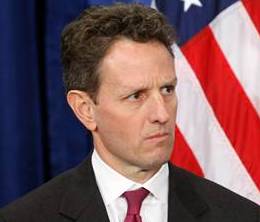ROUNDUP: US seeks dramatic expansion of financial regulatory powers
 Washington - President Barack Obama's administration, in a massive overhaul of the US financial regulatory system, is seeking the power to keep watch on all types of financial firms and to seize failing companies integral to the health of the system.
Washington - President Barack Obama's administration, in a massive overhaul of the US financial regulatory system, is seeking the power to keep watch on all types of financial firms and to seize failing companies integral to the health of the system.
US Treasury Secretary Timothy Geithner unveiled the plans in congressional testimony on Thursday, arguing that the current financial turmoil has proven the system is "too unstable and fragile" to be allowed to manage itself.
"To address this will require comprehensive reform. Not modest repairs at the margin, but new rules of the game," he said in testimony before the Financial Services Committee of the House of Representatives.
The Obama administration believes its overhaul could prevent firms from taking the kinds of risks that have until now led the financial industry into an endless cycle of bubbles and collapses. The current crisis, caused by a collapse of the US housing market after a decade of growth, is considered the worst since the Great Depression.
Geithner proposed tasking a single government regulator with broad oversight over the entire financial industry, including over derivatives markets and major non-banking financial firms such as hedge funds and insurance firms that have effectively remained outside the reach of government until now.
Geithner did not say which regulator should take on the task of monitoring the financial industry and warning of impending crises in future. Many have suggested the Federal Reserve, the US central bank, is best suited for the job.
The regulatory overhaul marks the latest element of Obama's efforts to stabilize a financial industry that has led the United States and wider world into recession. Earlier this week Geithner unveiled a 1-trillion-dollar public-private plan to take toxic mortgage assets at the centre of the crisis off the balance sheets of banks.
The latest details also fulfil a key demand of other governments, especially in Europe, who have pushed the United States to outline its regulatory reforms ahead of a summit of the Group of 20 (G20) nations on Tuesday in London.
Geithner said the US would be pushing for higher standards and a "common approach" to regulation across governments during the G20 summit. One of the suggestions on the table includes a so-called college of supervisors that could monitor the largest multinational firms.
But many US lawmakers in both political parties are skeptical about granting the government broad new control over major financial firms, fearing that too much regulation could choke off innovation and growth of the US economy.
"It is important that as we rush to save our economy that we do not suffocate our economy," said David Scott, a Democratic congressman from Georgia.
A number of major US financial firms have failed since September and others have been given hundreds of billions of dollars in emergency government loans to preserve the stability of the US financial system.
The financial collapse has been blamed on Wall Street firms taking on too much debt and unnecessary risks in the US mortgage market, but also on government regulators who failed to warn of an impending crisis.
Obama's plan would strengthen regulation primarily on the largest financial institutions, whose failure can effectively threaten the entire economy. The new regulator could, for example, order firms that are taking on too much debt to increase their capital holdings.
"This crisis has made clear that certain large, interconnected firms and markets need to be under a more consistent, and more conservative regulatory regime," Geithner said. (dpa)